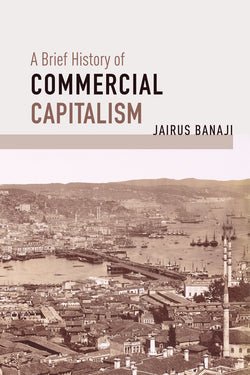Haymarket Books
A Brief History of Commercial Capitalism by Jairus Banaji
A Brief History of Commercial Capitalism by Jairus Banaji
Couldn't load pickup availability
-
The rise of capitalism to global dominance is still largely associated – by both laypeople and Marxist historians – with the industrial capitalism that made its decisive breakthrough in 18th century Britain. Jairus Banaji’s new work reaches back centuries and traverses vast distances to argue that this leap was preceded by a long era of distinct “commercial capitalism”, which reorganised labor and production on a world scale to a degree hitherto rarely appreciated.
Rather than a picture centred solely on Europe, we enter a diverse and vibrant world. Banaji reveals the cantons of Muslim merchants trading in Guangzhou since the eighth century, the 3,000 European traders recorded in Alexandria in 1216, the Genoese, Venetians and Spanish Jews battling for commercial dominance of Constantinople and later Istanbul. We are left with a rich and global portrait of a world constantly in motion, tied together and increasingly dominated by a pre-industrial capitalism. The rise of Europe to world domination, in this view, has nothing to do with any unique genius, but rather a distinct fusion of commercial capitalism with state power.
Reviews-
Endorsements
“In this majestic work of critical historical scholarship, Jairus Banaji has built a de finitive argument that commercial capitalism is the essence of capitalism, that it has dominated eras usually asserted to be pre-capitalist, and that it has persisted into the present.”—BARBARA HARRISS-WHITE, emeritus professor of development studies, Wolfson College, Oxford University
“This book is Jairus Banaji at his scholarly and provocative best. With his remarkable knowledge of world literatures, Banaji has produced a major exercise in the global and historical analysis of capitalism, affecting how we grasp capitalism today and how we understand and use Marx to do so—theory as history indeed.” —HENRY BERNSTEIN, emeritus professor of development studies, School of Oriental and African Studies, University of London
“With mind-boggling erudition, command over an extraordinary range of historical materials in multiple languages, and a theoretically sophisticated irreverence for received dogma, Jairus Banaji dislodges many a eurocentric account to offer an absorbing, thought-provoking, and truly global story of the emergence and varieties of capitalism.”—LALEH KHALILI, professor of international politics, Queen Mary University of London and author, Sinews of War and Trade
More praise for Jairus Banaji
“From the impact of slavery, the rise of the poor taking control, and the role of other philosophies and faiths impacting the discussion, Theory as History is a unique way to discuss history, economics, and the people behind it, a core addition to any community library history collection.”
—Midwest Book Review“The great merit of this volume is that it establishes an approach for [the debates about the nature and origin of capitalism] that is deeply theoretical, but at the same time refreshingly unhampered by the kind of doctrinaire attachment to a perceived (and often misread) orthodoxy that plagued so much of “historical materialism” for the past century. It is scholarly, without being purely academic ... Banaji’s book deserves to be read and debated as one of the starting points for a new wave of Marxist historiography, still in the process of liberating itself from the ghost of its formalist past." ”
—Pepijn Brandon, International Socialism“Banaji’s seemingly idiosyncratic but in fact highly sophisticated and original approach to historical analysis provides not only a welcome stimulus and a challenge for scholars today, but also will give them plenty to think about for many years to come." ”
—Marcel van der Linden, research director of the International Institute of Social History“Theory as History is a book written at the summit of a lifetime’s engagement with issues of Marxist theory and practice ... Banaji’s work demonstrates that no aspect of human history is irrelevant to the present. His scholarship shows immense skill, depth and range … [proving] it is not the Marxist method that has been at fault, but the dominance of non-Marxist theory and method in the minds of Marxist.”
—Counterfire
-


